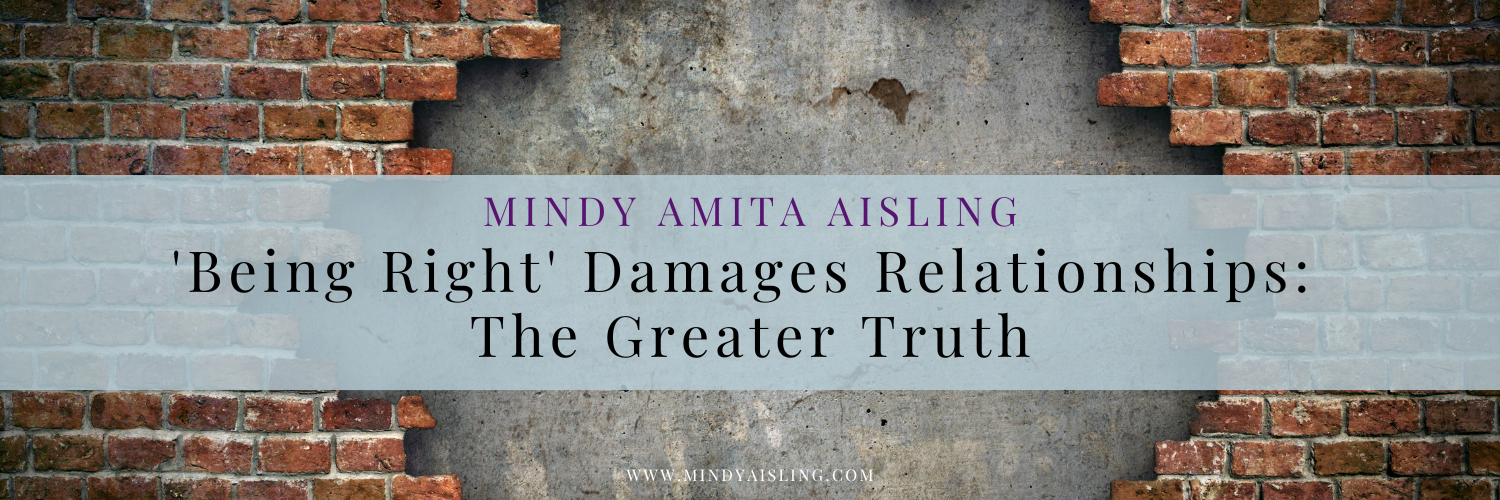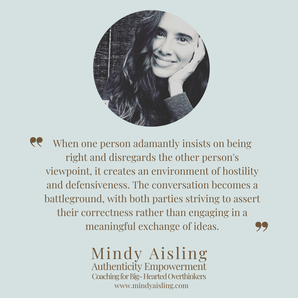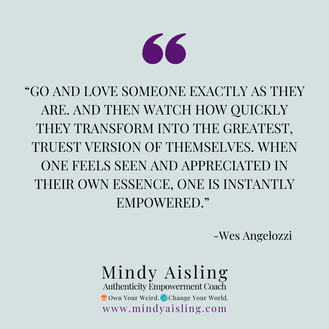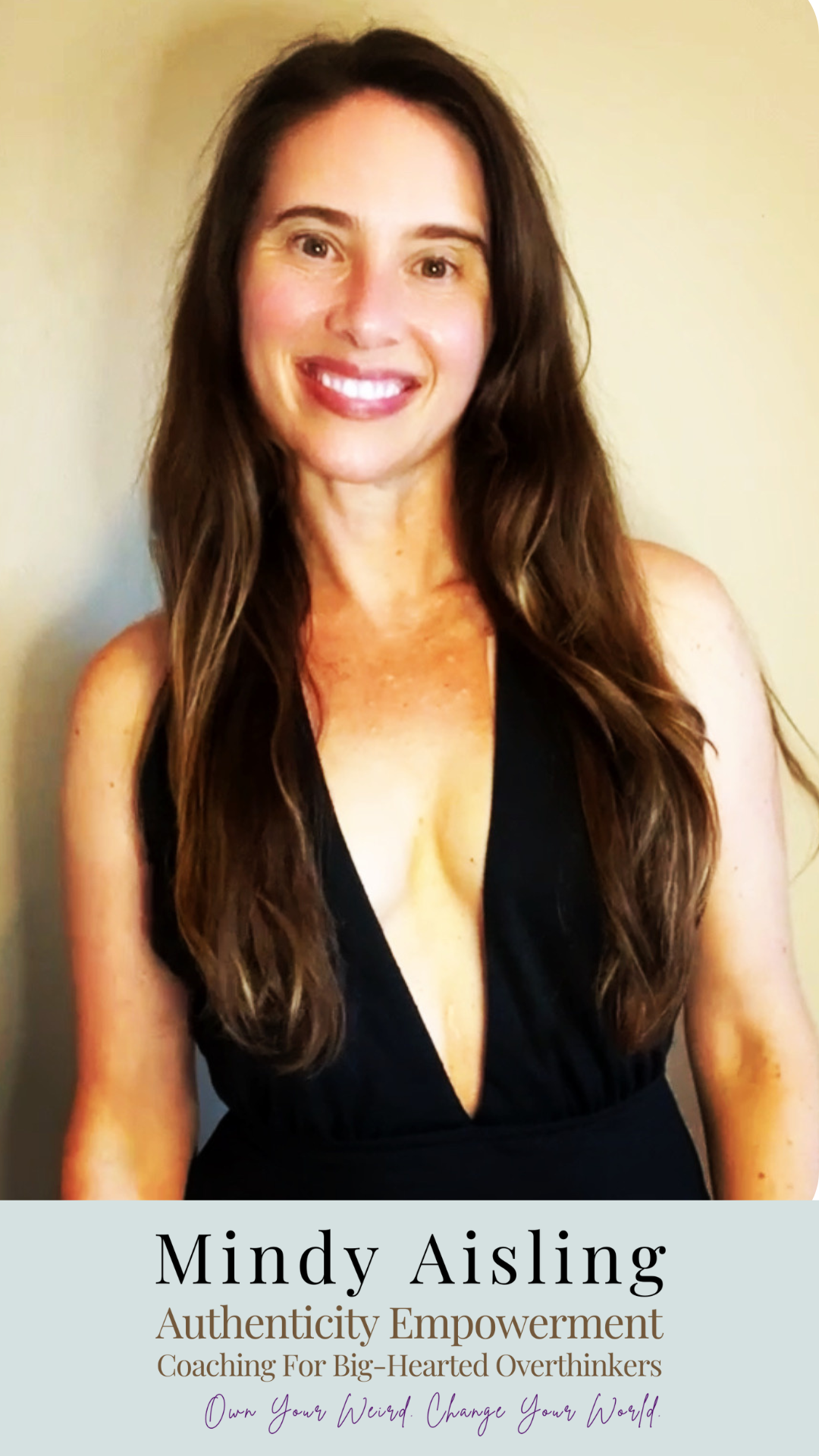|
Relationships thrive on understanding, compromise, and empathy. When individuals become entrenched in the belief that their opinions are absolute truths, while dismissing the perspectives of others as unequivocally wrong, it can inflict significant damage on those relationships. Being stuck in the notion of 'being right' erodes the foundations of healthy connection, and has a detrimental effect on communication. Effective communication is the foundation of healthy relationships, whether personal or professional. When individuals hold a rigid belief in their own moral superiority or correctness, it creates an environment of closed-mindedness and undermines meaningful dialogue. Self-righteousness is defined as, "having or characterized by a certainty that one is totally correct." I would describe it as, "lacking understanding regarding the difference between data and story, and believing that "your story" is "fact", or "the truth." Self-righteousness breeds a closed-minded attitude that leaves little room for empathy, curiosity, or understanding. When individuals firmly believe they possess the ultimate truth or moral high ground, they tend to dismiss alternative perspectives. Consequently, conversations become one-sided and lack the necessary exchange of ideas, thus preventing growth, learning and connection. In professional relationships, a lack of openness inhibits the development of creative solutions and stifles collaboration, leading to interpersonal conflicts and stagnation. In personal relationships, self-righteousness blocks connection, and prevents accurately seeing the other persona and knowing who they really are in their most beautiful, authentic expression. When one person adamantly insists on being right and disregards the other person's viewpoint, it creates an environment of hostility and defensiveness. The conversation becomes a battleground, with both parties striving to assert their correctness rather than engaging in a meaningful exchange of ideas. As a result, dialogue becomes superficial, leading to misunderstandings, resentment, and strained relationships.
Self-righteousness often manifests as judgment and condescension towards others. Those trapped in their own righteousness tend to view opposing viewpoints as inferior or flawed. This judgmental attitude alienates others and creates a hostile atmosphere, discouraging open communication. People become defensive when they sense condescension, and as a result, constructive dialogue becomes nearly impossible. The focus shifts from understanding and cooperation to proving one's superiority, further widening the communication gap.
Empathy is an essential component of effective communication. However, self-righteousness hampers the ability to empathize with others' experiences and perspectives. When individuals consider themselves morally superior, they may dismiss or belittle the emotions and experiences of those who disagree with them. This lack of empathy can lead to misunderstandings, hurt feelings, and broken relationships. Successful communication requires genuine efforts to understand and acknowledge the feelings and viewpoints of others, even if they differ from our own. Additionally, self-righteousness often causes individuals to resist or disregard feedback and constructive criticism. When people believe they are always right, they are less likely to engage in introspection and self-improvement. Consequently, communication becomes stagnant, as growth and development are hindered by the unwillingness to consider alternative perspectives. True progress is only possible when we are open to feedback and willing to challenge our own beliefs and biases. Overcoming Self-Righteousness:
The rigid belief that one is right and the other is wrong can seriously damage relationships. We can foster stronger, healthier connections by understanding the consequences of this mindset and implementing strategies to cultivate open-mindedness, active listening, empathy, and constructive dialogue. Remember, relationships thrive on mutual respect, understanding, and a willingness to acknowledge and embrace different perspectives.
0 Comments
Leave a Reply. |
AuthorMindy Amita AislingAuthenticity EmpowermentLife Coaching for Big-Hearted Overthinkers & Entreprenerds🐲Own Your Weird
🌎 Change Your World ⬇️ DIY Courses 👩🏻💻1:1 RemoteCoaching Fully Accredited ICF Certified Mindy Amita Aisling, is a professionally trained and board-certified leadership, authenticity, and entrepreneur coach.
Mindy exceeds all requirements set forth by the International Coaching Federation (ICF) for Master Coach certification. Mindy is also a licensed mediator, communications coach, and conflict resolution practicer. As a mediator, she has worked both in private practice and as a court appointment mediator at her local county courthouse. Through her innovative approach, she assists clients in examining their limiting beliefs, questioning their assumptions about how the world works, and releasing the notion that they are anything less than perfect. As a result, individuals who work with Mindy cultivate the ability to stand firm in their beliefs, live authentically and decisively, and discover an experience of life that is easy and graceful. In 2021, Mindy founded How to Be Human and Entreprenerd. These programs have enabled her to share her wisdom and knowledge with a broader audience in service of her vision of helping others live authentic lives This, in turn, has empowered more individuals to lead their most TRUE and COURAGEOUS lives. When she is not working, Mindy can be found playing outdoors in the beautiful Pacific Northwest, creating art, spending time with friends & family, or with her nose deep in a book. You can sign up for her newsletter here. Archives
June 2024
Categories
All
ICF Certified Life CoachAffordable Online Life Coaching |





 RSS Feed
RSS Feed
